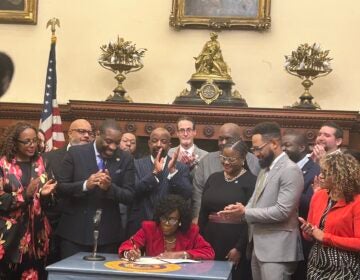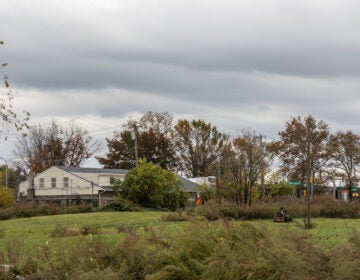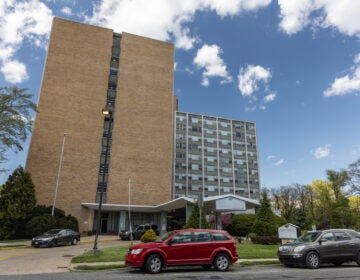Philly maps 10-year course toward building, preserving 100,000 housing units
Detailing the strategies Philadelphia hopes to employ to create or preserve 100,000 units of housing in the next 10 years, the city’s new housing plan dropped on Wednesday.

Clouds pass over the Schuylkill River and Philadelphia's skyline. Officials are considering a new plan to preserve or build 100,000 housing units over the next 10 years. (Matt Rourke/AP Photo)
This story originally appeared on PlanPhilly.
—
Detailing the strategies Philadelphia hopes to employ to create or preserve 100,000 housing units in the next 10 years, the city’s new housing plan dropped Wednesday.
It received a largely warm welcome from City Council members and housing industry insiders who had reviewed it by the end of the day.
Many respondents noted that the plan is ambitious — it includes several policy proposals that proved controversial — while notably avoiding comment on several large roadblocks facing the city’s housing policy.
The administration is adamant that it is not an affordable housing plan. But perhaps that is simply a concession to reality. Recent research shows the staggering scale of need in the city, with four out of five low-income households receiving no housing assistance. And the plan is clear-eyed on the likelihood that Philadelphia will receive no additional support from the city or the state anytime soon.
“I think this is an ambitious housing plan,” said Councilwoman Helen Gym. “Housing is the most urgent issue in this city. It’s so important to realize that in a city with the highest poverty rate of any major American city, the housing crisis is not just a symptom but a cause of poverty.”
The proposal includes a rubric of differing policies for strong market areas, middle neighborhoods, and divested communities.
In divested neighborhoods, where incomes are low and investment scarce, it proposes additional dollars for housing repair, a beefed-up eviction prevention plan, and shallow rent subsidies to help Philadelphia’s poorest.
The city’s director of planning and development, Anne Fadullon, has consistently mentioned the possibility of municipal rent assistance for at least a year. It’s a concept that has garnered support from City Council, in particular from Gym, who has focused on eviction policy. Additional details are provided in this report, with the idea of targeting a shallow rent subsidy of $300 per month for a year for families transitioning from homelessness or facing a rental crisis.
Additionally, legal support for renters facing eviction is named as a key strategy.
“Create an Eviction Prevention Program to provide tenants at risk of eviction with legal assistance to avoid an eviction proceeding,” the report states. “If the landlord files suit, the program will provide legal support to eligible low-income tenants in housing court.”
For the city’s middle neighborhoods, the cause célèbre of Councilwoman Cherelle Parker, the plan advocates shoring up such areas with home repair programs for those who are already there and offering assistance with closing costs to help new families get a stake in the neighborhood.
“I am pleased that the city has now developed a holistic housing plan that does not pit the ‘have nots’ versus the ‘have a little bits,’” said Parker. “I am also extremely pleased that the plan provides tools that will help preserve middle neighborhoods … which will help those residents who are generally excluded from income-based assistance programs maintain their homes and keep neighborhoods stable.”
One notable component is a proposal to reduce or eliminate the real estate transfer tax, which has increased several times in recent years. The proposed reduction would help first-time homeowners under a particular income.
Councilman Allan Domb cautioned that such a policy would be tricky to implement.
“I’ve been working on a bill for that, but it’s very, very hard to track and monitor,” said Domb. “In theory, it’s a great idea. How do you prove it is their first home?”
The report also suggests implementing accessory dwelling units, a zoning tweak that would allow homeowners to provide additional housing on their properties.
The concept is being taken up in Denver, Seattle and other hot-market cities where it’s hoped that it can both produce low-cost housing and provide rental income to lower-income homeowners who struggle to keep up with costs.
But the concept ran into trouble during the zoning code changes under Mayor Michael Nutter’s administration, when Councilman Brian O’Neill, who represents the Far Northeast, fought against including auxiliary dwelling units in the zoning code. Although language enabling them is contained in the new zoning code, no specific zoning districts allow them.
Similar problems face some of the suggestions framed as targeting the city’s strongest market neighborhoods. The robust array of property tax aid programs for low-income homeowners is praised and will no doubt remain politically palatable, but increasing the density allowed in higher-income neighborhoods will be a challenge.
Even Domb, who is an at-large councilman less responsive to neighborhood groups, said he would embrace that idea only if local community groups would sign on. From Spruce Hill to Society Hill, for various reasons, they have been reluctant to do so.
From the opposite end, the Building Industry Association — which represents residential developers — said that the benefits of upzoning for density are limited in many areas where parking requirements and height restrictions constrain growth.
“It’s a step in the right direction, but what would really move the needle would be relaxation, or even better elimination, of parking requirements,” said Leo Addimando, association vice president.
But parking was never mentioned in the report. Instead, a new bill increasing parking requirements in at least some parts of the city is expected later this Council session.
Councilmanic prerogative, wherein council members enjoy total control over legislation that specifically affects their territory, also goes unmentioned — although it is a serious check on some of the ideas in the report.
Another complication facing affordable housing in Philadelphia — the city’s strong building trades unions — is addressed. Could a project labor agreement be reached with the construction unions, “that would allow a lower union wage rate for affordable housing projects that is in line with the federal prevailing wage rate.”
“People have been trying to do that for a very long time,” said Beth McConnell, policy director of the Philadelphia Association of Community Development Corporations. “If they could get that done, and the mayor really put his leadership behind that, that would be an enormous accomplishment if they could get a meaningful discount.”
The housing plan was crafted outside of the limelight, without much broad public engagement. McConnell said that stakeholder groups were told to get feedback to the administration by next week, which doesn’t provide much time for careful consideration from those who haven’t been on the inside.
“Some of these ideas are good, but how much of this is a practical roadmap versus a set of aspirational ideas,” asked McConnell.
WHYY is your source for fact-based, in-depth journalism and information. As a nonprofit organization, we rely on financial support from readers like you. Please give today.







